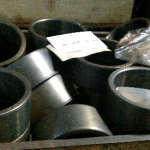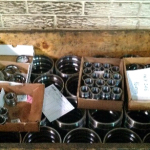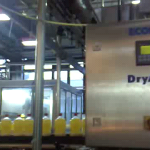
How ‘Leasing’ Chemicals Can Contribute to A Cleaner Environment
By Ana Maria Evangelho Oestreich (interviewee) & Maria Grineva (interviewer)
28 July 2020 |Interview
This is a fist publication that highlights the situation on a market of consulting services and a role a consultant can play in promoting and implementing a new business model. Ana Maria Oestreich, a consultant from Brazil, speaks about her experience and challenges with this new business model, and how she benefited from getting specialized in Chemical Leasing.
Key Words: Consulting services, Environmental management, Chemical Leasing
Ana Maria Evangelho Oestreich, a Brazilian chemical engineer with an MSc in environmental sanitation, has been a consultant for Chemical Leasing in Brazil and Latin America since 2012. She obtained recognition from UNIDO for her efforts to promote Chemical Leasing in Brazil, winning the silver award in the category of public relations of the Chemical Leasing Global Award.
What are the potential benefits of adding Chemical Leasing as a service to a consulting portfolio? And how best to sell Chemical Leasing as a service?
There is a long way to go towards consolidating consultancy in Chemical Leasing in Brazil. In early 2012, most companies did not understand how Chemical Leasing works, although some companies had already implemented certain aspects of Chemical Leasing using other names. Users of chemicals wanted cost reductions, while suppliers were interested in long-term contracts, especially with “high volume chemicals consumers”. Even after eight years of efforts in Brazil, the consulting market for Chemical Leasing is not yet consolidated. However, interest in Chemical Leasing is growing, because it is linked to Circular Economy and to the Sustainable Development Goals, which are of greater interest to companies today. The Chemical Leasing Global Award has also been a relevant factor in increasing the interest of companies and research institutions in the subject. One single post made on LinkedIn led to 557 views in a week!
Today, there are a very few consultants in Brazil with a comprehensive understanding of Chemical Leasing who can apply the UNIDO toolkit.
In general, they are specialists in chemical safety, green chemistry, circular economy and cleaner production, with a good understanding of the concept of Chemical Leasing. I recommend to start promoting Chemical Leasing as a consultancy service with training courses to companies, researchers and other stakeholders.
- With the growing recognition of the Chemical Leasing business model, the consultants who include it in their portfolio have more opportunities in the environmental consulting market in the areas of:
teaching and training; - submission of projects to awards and national funds for innovation;
- integration with research and development groups;
- evaluation of industrial processes, with the objective of reducing waste and consumption (water, toxic substances, among others);
- technical support for development and monitoring of Chemical Leasing projects.
Including Chemical Leasing in my services portfolio has opened up opportunities for me in academic and governmental areas, for teaching, and for evaluating projects. Brazilian authorities also recognise me as a Chemical Leasing expert.
What are the requirements for being a Chemical Leasing consultant?
One of the most important requirements of a Chemical Leasing consultant is to understand the needs and requirements of the company using a chemical and the market segment supplying that chemical. The consultant with a background in engineering (chemical, environmental or industrial engineering) can help a company identify areas suitable for Chemical Leasing. In cooperation with suppliers, they can help the company reduce its costs, comply with environmental legislation and achieve internal environmental goals. Likewise, health and safety requirements must be fully observed. So, familiarity with health and safety regulations and chemicals management tools are necessary requirements for Chemical Leasing consultants. To be able to make suggestions on business models, payment units or performance-based contract models, specific marketing knowledge may be required.
Usually, contracts that involve the provision of services or supply of chemicals involve relatively high costs for a company. So these contracts are not drawn up by external consultants, but by the company’s legal department or by law firms that the company regularly hires. However, the Chemical Leasing consultant, with their experience in environmental management, chemicals management, safety and health, can make suggestions that can be included as attachments to the contracts. Since it is internal or contracted lawyers who are elaborating the contracts, it is important that they understand the concept of Chemical Leasing, because those contracts include the safeguards to protect the company.
The ability to bring together and integrate different interest groups is helpful in the quest to bring different departments in a company together and getting their understanding and commitment. Not only the relevant operational areas, but also departments like purchasing, environmental management, and quality control must be involved in the implementation of a Chemical Leasing business model. A Chemical Leasing consultant must have good communication skills. The consultant is normally responsible for the awareness raising and training of internal personnel and suppliers.
The consultant is also frequently a speaker in seminars and will be holding meetings with academia and the authorities.
What are challenges in searching for potential Chemical Leasing cases? What are the solutions?
The ideal potential Chemical Leasing case is the one in which the partners properly understand the concept and their roles in it and see a mutual benefit in the business relationship: economic but also environmental. Economic benefits are, in general, the driving force to change the business model.
In general, it requires some time for both parties to establish a partnership. On the user side, the companies may feel insecure about this business model, as they often first confuse Chemical Leasing with outsourcing. For the supplier, it is of utmost importance to have salespeople with a technical background, who can understand the needs of their customers and follow up on the use of the products being offered. Once the parties are convinced of the benefits of Chemical Leasing, the biggest challenge is to establish the unit of payment and demonstrate how the units are to be measured. A pilot project can be a good start to implement Chemical Leasing. This has low risks for both parties: the supplier has time to better understand the user’s requirements; the user has time to adjust and keep the process more uniform.
In some cases, there are technical and economic barriers to the implementation of Chemical Leasing. Chemicals perform differently depending on whether obsolete or state-of-the-art equipment is being used, or they require specific conditions like temperature or humidity. In addition, the analysis of the investments required must consider the payback period but also other external costs, such as environmental risks, penalties or market requirements.
As Chemical Leasing becomes better known and more companies apply the business model, an increase in the supply of new technologies, equipment, research resources, technical and legal consultancy and logistical support services can be expected.
In my opinion, one of the main ways to overcome legal, technical, economic and social obstacles is to make information available and to disseminate success stories. Certainly, in the case of Brazil it is important to have national success stories. As Brazil has a big market for all kinds of products, it is common for companies to look closely at national trendsetting organisations or at what their competitors are doing. In the competition for market share, production costs and image are very relevant.
The last step, once there is a solid understanding of the economic, social and environmental benefits of Chemical Leasing, is for governments to include it in their policies, creating incentives and subscribing to international mechanisms.
Seminars, training programs, company case studies, special awards like the Global Chemical Leasing Award, sustainability reports, are some of the activities which will disseminate Chemical Leasing and overcome barriers to it becoming a standard business model.
You developed the first case of Chemical Leasing in the tourism sector. What was your experience in introducing the model to a hotel? What are the particularities of working with a hotel on Chemical Leasing? Do you see a good potential for replication in the tourism sector?
It is important to remember that a hotel uses more than 30 different chemicals: furniture polishes, detergents, insecticides, floor waxes, pool products, glass cleaners, dishwashing and laundry powders, flavourings, among others. Monitoring chemicals consumption is totally infeasible for a hotel manager without the support of the supplier. Accidents with chemicals are frequent and they can damage clothes, equipment and installations, as well as cause injury to the staff. In addition, the consumption of chemicals is a significant portion of a hotel’s operating costs. The benefit of Chemical Leasing shows up in the monitoring of consumption, and in the training of employees to ensure the least possible impact on health and the environment. Last but not least, it brings cost reductions from less product losses, damages and accidents.
The first attempt to develop the Chemical Leasing model with a group of small inns at Búzios beach in Rio de Janeiro failed. My team found a number of barriers to a successful implementation of Chemical Leasing: lack of standardisation of cleaning processes in these hotels, low profit margins, and the low skill levels of their staff.
The Windsor Atlântica Hotel case study was a golden example, but also challenging for a consultant. When we met with the hotel management, we discovered that they already had a performance-based relation with Ecolab, but they had never linked the contract with the hotel’s environmental management and did not document any of the environmental as well as heath protection benefits.
The identification of suitable indicators and their monitoring, and the comparison of their results with other small, well-managed companies, convinced the hotel chain to introduce the Chemical Leasing business model into the group. The 2014 Global Chemical Leasing Award played an important role, not only because of the recognition they received with their gold award. The whole process of preparing the application forms involved the hotel staff in the monitoring of economic, social and environmental indicators related to the Chemical Leasing contract, showing how the business model positively impacted the environmental and the quality control management. The gold medal was the “cherry on the cake” and turned on the lights for other hotel units in favour of Chemical Leasing.
The tourism industry is an ideal sector for Chemical Leasing because it needs efficient and economic technological options in the field of cleaning. Large hotels, big restaurants or the cruise ship industry, to name just a few, are excellent potential customers for Chemical Leasing as they require a steady purchase of chemicals throughout the year and need swift and efficient service.
Source:
Image copyrights: Freepik


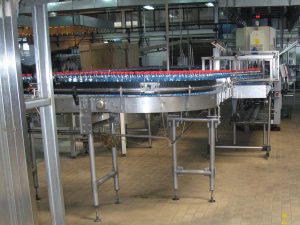
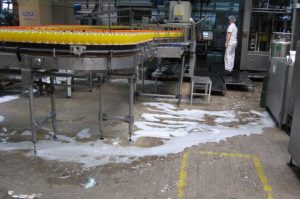
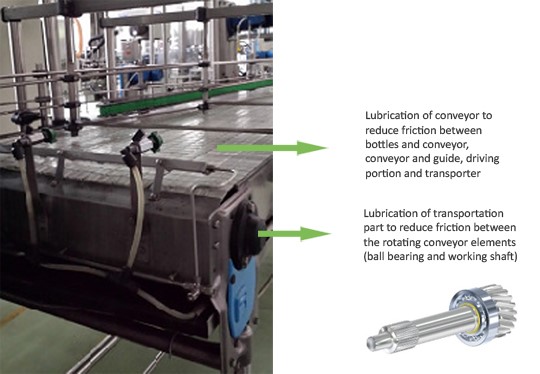 Picture 1: Conveyor lubrication
Picture 1: Conveyor lubrication
